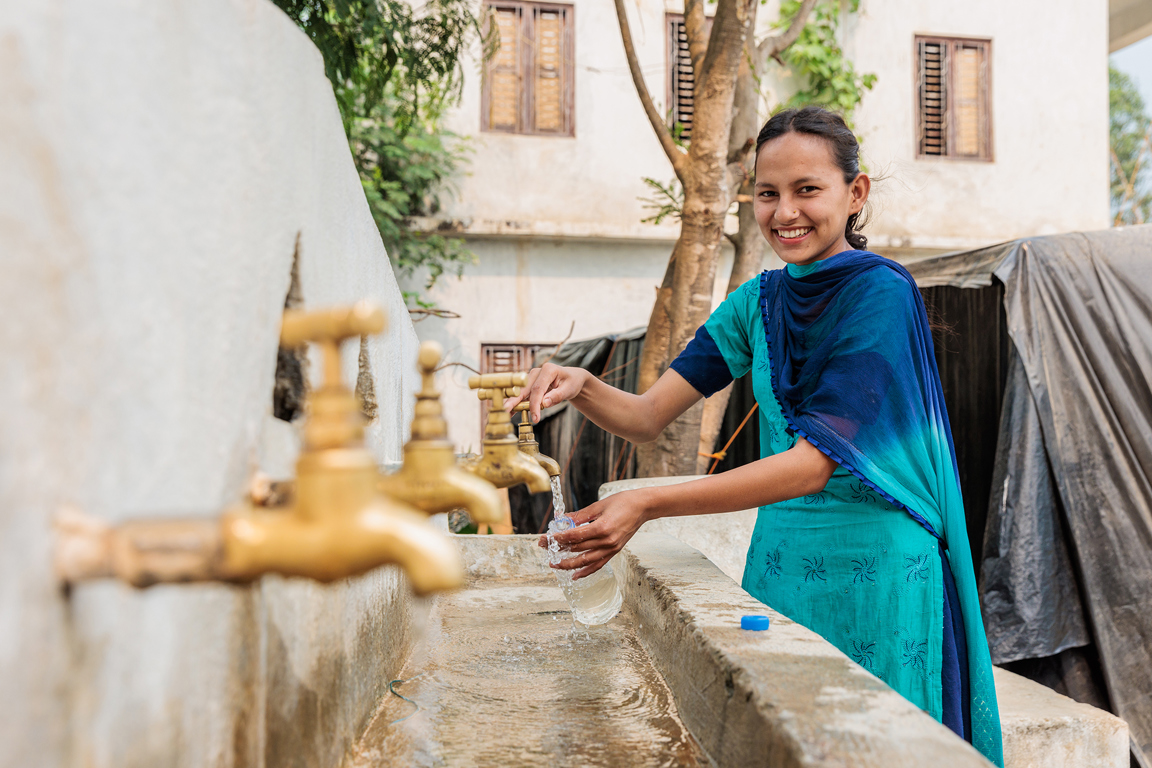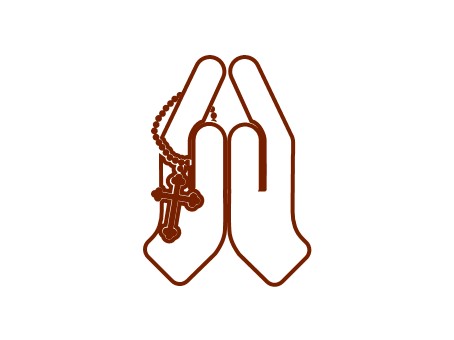Human Dignity
Middle Primary
What is dignity?

Laxmi using a water tap that she advocated to have installed as a member of the Child Club at her old school in Jajarkot district, western Nepal. Photo: Richard Wainwright/Caritas Australia
Inquiry Question: What is dignity?
By the end of this unit, students will have explored the significance that we are all made in the image and likeness of God, and the social implications of this, and question what happens when others are not treated fairly in light of this knowledge.
Before you start:
-
Watch the Catholic Social Teaching (CST) film, ‘Human Dignity’, for your own background and familiarise yourself with the Human Dignity poster.
-
Download the various resources referenced at the bottom of this page (worksheets, slides etc.). Print handouts and have the presentation and weblinks ready to go on your computer/interactive whiteboard.
-
Read/watch the stories and videos linked in this learning sequence to determine if they are appropriate for your class.
-
Locate Scripture passages and copies of Church texts (hyperlinked within the learning sequence below).
See-Judge-Act-Pray Process
This learning sequence has been created using the ‘See, Judge and Act’ model. This reflection–action process was first used by a Belgian Catholic priest, Joseph Cardijn (who later became a Cardinal) with Young Christian workers prior to the first World War. This approach was also recommended in the 1961 encyclical letter written by Pope John XXIII called Mater et Magistra (Mother and Teacher).
Definition
-
a belief that every person is made in the image of God and is intrinsically valuable and worthy of respect, simply because they are human
-
a quality of being human, independent of ethnicity, creed, gender, sexuality, age, or ability
-
a reality challenged by poverty, hunger, oppression and injustice.
Student-friendly explanation of Human Dignity:
- Every person is made in the image of God.
- We are all valuable and worthy of respect and fairness because we are all human.
Learning intention
We are learning:
- to understand the meaning of the term ‘dignity’
- what our human rights are and how we can use this understanding to uphold the human dignity of others
- what the Church teaches us about human dignity
- how Caritas Australia strives to uphold the dignity of others
- how we can uphold the dignity of others.

SEE
Using the Inside/Outside strategy, students discuss their current understanding of the term ‘dignity’.
Present the definitions of the term ‘dignity’ found in the Human Dignity presentation. Read each of these definitions and ask students what the key words for each definition are.
Create a Word Wall adding the definitions and key words. Repeat the Inside/Outside strategy to discuss what students now understand the term ‘dignity’ to mean, and what ‘human dignity’ means.
Extension Activity: Students create a visual representation for the word. For example, the letter T in the word, Justice, may be a set of scales.
Note: over the course of the lesson sequence, add new words to the word wall.
Review prior knowledge of the concept of human dignity from a Catholic perspective. Display Genesis 1:27 quote - the Bible teaches us that we are “created in the image of God”. Discuss the meaning of this quote.
Read and display the Scripture verse Galatians 3:26-28 and then display the Human Dignity poster and discuss how the poster is exploring the concept of Human Dignity. (Dignity is a gift from God, no one can take it away. We are all equal in dignity.)
Students are then to create an acrostic poem using the student worksheet.
Watch What are Children’s rights? After the video, discuss what are children’s rights and why it is important that every child know their rights.
Display and explain the provided list of children’s rights that is outlined in the United Nations Convention on the Rights of the Child. Ensure students understand that by upholding these rights we are respecting Human Dignity. Allocate a children’s right to each student (or they may work in pairs, if required) by distributing the cut-up slips created using pages from student handout. Students create a poster on their allocated child right that includes the child right and a picture to represent this right. Add these posters to the class word wall.
Source: Amnesty UK

JUDGE
Read and display Psalm 139:13–14 (slide 9 Human Dignity Presentation). Students have silent time to reflect on what this Scripture verse means for them as individuals and for others. Discuss: What does this quote mean? What does this quote suggest about God’s creation of humanity? How should we think of ourselves? Of others?
‘Text Connections’ - Students complete the Text Connections worksheet where they read the definition and scripture and make connections: ‘text-to-self, text-to-text, text-to-world’.
Fratelli Tutti Matching Activity - Students are given either a modified Encyclical quote relating to human dignity or an illustration from the student handout. Provide students time to consider the meaning of their quote or consider what their illustration is displaying. Students find their partner by matching the quotes and illustrations together. Once everyone has been able to find their partner, discuss key ideas that are being displayed.
Display the quotes and illustrations on the word wall. Solutions are available in presentation resource.
- Teacher’s Note: Students might make different matches from the solutions provided which is encouraged provided they can say why they think their quote/illustration matches.
Explain to the class that Caritas Australia is a part of the Catholic church and works to uphold human dignity by working with communities to ensure they have what they need.
Read Laxmi’s story
Breakdown the key aspects of her story by completing the case study handout. Afterwards, using Think-Pair-Share strategy, discuss:
- what are the key points of her story?
- How were children’s rights not upheld for Laxmi?
- How did Caritas Australia and Caritas Nepal assist in achieving children’s rights for Laxmi?

Act
Explain that you are going to do something for someone else, a kind act, a thoughtful act that helps that person with something they might need. Explain that we show God’s love to each other when we do something to help them.
Brainstorm ideas of what they can do. Students write a commitment for a local and global action on the Student Commitment worksheet.

Pray
Note: The following prayer is also provided in the Human Dignity presentation.
Invite a student to read one line of the prayer each.
Creator God,
Your image is alive in every human person giving to each of us an unbreakable dignity.
Create in us a desire to act to work together and a willingness to share with others our time, our energy, our skills and talents, and our wealth.
As we share and enjoy the fruits of your creation, restore in us your vision of a world made whole, and inspire us to commit ourselves to the good of all.
Gracious God, give us ears to hear, eyes to see and hearts to love, so that we reflect you in our way of life; in our choices, words and actions. Jesus is the good news to the poor. As his followers, may we recognise the call to be the same. Amen.
Adapted Prayer Source: Australian Catholic Social Justice Council












